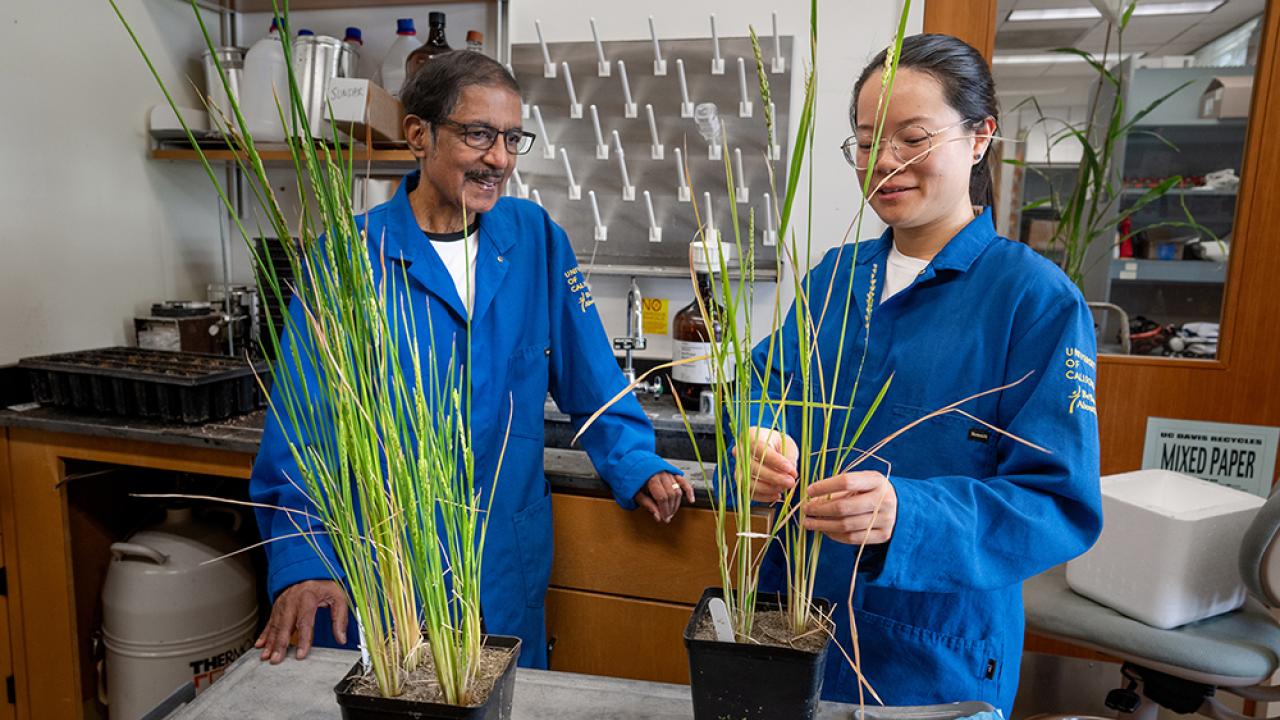
Sundaresan wins Wolf Prize in Agriculture
Team's discoveries point to higher yields for small-scale farmers
Quick Summary
- Pioneering work uncovers the molecular and genetic mechanisms behind plant reproduction.
- Synthetic apomixis is a boon to agriculture because it simplifies getting seed for high yielding, hybrid crops.
- Sundaresan credits effort of his team, including Imtiyaz Khanday.

Venkatesan Sundaresan has been awarded a 2024 Wolf Prize in Agriculture for key discoveries in plant biology that have had enormous impact on crop improvement. Sundaresan is a Distinguished Professor in the University of California, Davis, Department of Plant Sciences and the Department of Plant Biology.
The Wolf Prize in Agriculture, considered by many the Nobel Prize for Agriculture, has been awarded annually since 1978 and carries an award of $100,000. Sundaresan shares his award with Joanne Chory of the Salk Institute and Elliot Meyerowitz of the California Institute of Technology.
Sundaresan and his team developed "synthetic apomixis." The method is a boon to agriculture because it makes it simple to generate high-yielding, hybrid crops without going through the costly process of crossing different strains. The team first developed the method in rice and have since demonstrated its efficacy in maize. Now, they’re in the process of planning field trials to test the method at a larger scale.
“The success of this research is a testament to Professor Sundaresan’s brilliance and the collaborative spirit of his team,” said Helene Dillard, dean of the College of Agricultural and Environmental Sciences. “Their work exemplifies how academic endeavors do not exist in isolation, but are part of a broader, interconnected community effort aimed at creating real-world solutions. We celebrate his dedication to pushing the boundaries of science to benefit humanity while inspiring a new generation of scientists and farmers around the world.”
Basic science unravels secrets of apomixis

The Wolf Foundation selected Sundaresan for his groundbreaking molecular research on plant reproduction, which led to a method for producing clonal seeds from hybrid plants. The method mimics a process called apomixis that occurs naturally in many plants, including blackberries, dandelions and many citrus species. Apomixis allows plants to bypass sexual reproduction, resulting in plants that are genetically identical from one generation to the next.
“Synthetic apomixis” is Sundaresan’s lab-generated version. This makes it simple to generate and perpetuate high-yielding hybrid crops without having to cross different strains, which is an expensive and time-consuming process.
The breakthrough has enormous implications for farmers who can't afford to buy hybrid seed year after year, Sundaresan said.
“With these clonal hybrids, farmers can save some of their harvested seeds and replant them for the next year’s crop,” Sundaresan added. “This is very good news for smallholder farmers in developing countries.”
Sundaresan said he is honored by the Wolf Foundation’s recognition, particularly because his breakthrough came from basic “curiosity-driven” science.
“In conferring this award to three basic scientists, the Wolf Foundation is encouraging and recognizing fundamental knowledge as important and deserving of this kind of honor,” Sundaresan said. “People often think that, to solve an applied problem, we have to tackle the problem directly. But quite often, the solution comes from basic science, where you’re not aiming at an application.”
Khanday 'pivotal to success'

The work to develop synthetic apomixis was a team effort that involved many lab members, Sundaresan added.
“The concept of apomixis in a crop plant is decades old,” said Sundaresan. "In 1994, Gurdev Khush organized a conference on apomixis for future rice breeding.” Khush's thinking was "prescient," Sundaresan added. Khush, an eminent scientist recognized for his work in rice breeding and basic plant genetics, is now an emeritus adjunct professor in the Department of Plant Sciences.
“The eventual realization of this dream," Sundaresan continued, "was built upon the foundation of a fundamental understanding of plant reproduction, achieved through the efforts of many talented lab members and collaborators over several years.”
In particular, Sundaresan said, Imtiyaz Khanday was pivotal to the project’s success. He credited Khanday’s “creativity and perseverance in the face of setbacks, and dedication in pursuit of the final goal.”
Khanday worked on the project as a postdoctoral fellow and is now an assistant professor and assistant agronomist for the Agricultural Experiment Station in the College of Agricultural and Environmental Sciences.
Legacy of excellence with international impact
Sundaresan is the seventh professor from UC Davis to receive the Wolf Prize in Agriculture. In the Department of Plant Sciences, he joins awardees Jorge Dubcovsky, Gurdev Khush and Shang-Fa Yang. Other university recipients in prior years include Pamela Ronald, Harris Lewin and Roger Beachy.
“This prize is a very well-deserved recognition of Professor Sundaresan’s groundbreaking work applying an understanding of the basic biology of plant reproduction to create a highly impactful propagation process for hybrid crop strains that are critically important in developing countries,” said Mark Winey, dean of the College of Biological Sciences. “His work will continue to have a positive impact on farming for generations in many communities.”
Media Resources
- Venkatesan Sundaresan, Department of Plant Sciences, sundar@ucdavis.edu
- Andy Fell, News and Media Relations, 530-304-8888, ahfell@ucdavis.edu
Trina Kleist, communications specialist in the Department of Plant Sciences, edited this article, which first appeared on the UC Davis News website.
